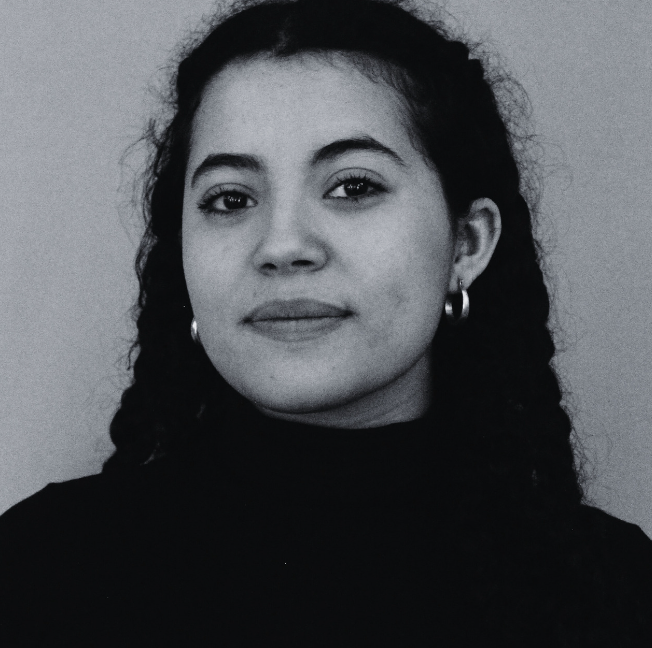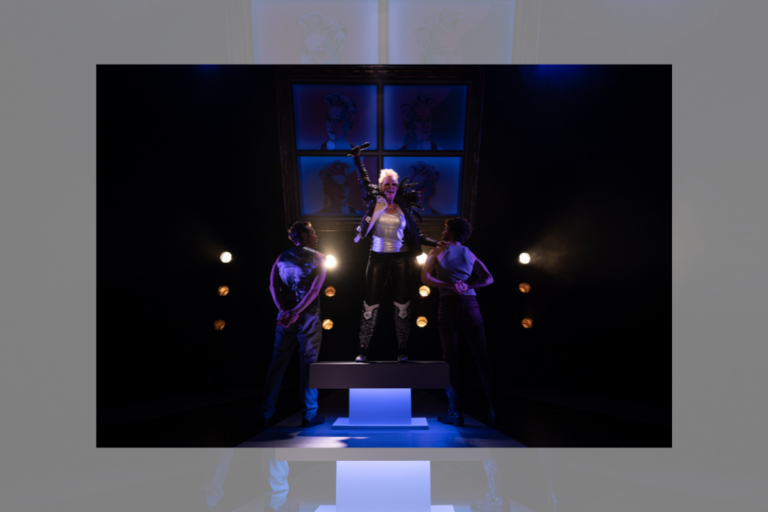REVIEW: Cahoots Theatre’s Sweeter balances sunshine and rain
I love smart, well-made theatre for young people.
Oh, Sweeter is such a treat.
Taking place 20 years after the American Civil War, Sweeter, a Cahoots Theatre production in association with Roseneath Theatre, written by Alicia Richardson and directed by Tanisha Taitt, follows Ralph (Daren Herbert) and his daughter Sweet Pea (Alicia Plummer) as they arrive at Zucker Farms. Ralph, a previously enslaved person, is thrilled at the prospect of buying land from the wealthy Mr. Zucker (Sébastien Heins), who makes a deal with Ralph to work on the patch of land until he can earn enough to own it. Sweet Pea gets the task of growing a scraggly-looking mango tree. And, delightfully, Sweet Pea discovers that the Mango Tree (Emerjade Simms) is alive and can talk! The Sun, whose name is Dee (Uche Ama), dressed in bright yellow from head to toe, can also talk, though she mostly sings soulfully and dances between scenes. It’s all very adorable.
Presented at Native Earth’s Aki Studio with the audience in raked seating, Sweeter is right out of a fairytale thanks to set designer Sim Suzer. A grand ladder in the middle is ripe for climbing and where the Mango Tree ultimately grows. There’s a brown picket fence, a shed, and the odd flower here and there: a garden ready to flourish. The set seems pulled right off a TVO kids show, and if I were a kid my mom would have had to hold me back in my seat to stop me from exploring Sweet Pea’s world. Taitt has a green thumb for teasing a vivid tone for the piece, letting the audience fall in love with the land and people of Zucker Farms. At the same time, Taitt’s direction is straightforward, and with such a grandiose set with so much playing space, I wish it had been used even more fulsomely with creative blocking choices.
Plummer’s Sweet Pea stands out as a vibrant cartoon figure providing a bright perspective for the younger audience to follow, a strong choice by Taitt. Personally I found the contrast between Plummer’s performance and more naturalistic acting from the rest of the ensemble a tad distracting, but it’s certainly not an Achilles heel for the production. Sweet Pea is a special role model for young audiences: she is quick-witted, outspoken, and taught to believe in herself. She is attentive to her Mango Tree and uses this empathy as her superpower.
The Mango Tree is buoyant and surprisingly suave, serving as a foil and friend for Sweet Pea. Mango Tree experiences rapid change around her that isn’t always pleasant, and she learns that growing isn’t easy. (The Mango Tree blooms through the addition of foliage and mangoes that hang from the theatre scaffolding, as Sweet Pea navigates the twists and turns of growing up.) I would have loved to see Mango Tree’s costume, a brown leotard with green leaves, also develop alongside the set to amplify the blooming effect, perhaps even intertwining with the set.
While Dee gleefully shines light on Zucker Farms every morning, Richardson is unafraid to lean into darker and more complex themes. The ever-impressive Heins is a captivating villain: oozing corruption and dripping with fake sincerity. Zucker takes advantage of Ralph’s work ethic and the fruit of the Mango Tree, and ultimately acts as a horrifically destructive force in the story. The latter end of this play is where Taitt’s directorial edge shines: she delivers a cathartic ending by building tensions between actors. There is a really interesting dark edge to this piece as misfortune rains on Sweet Pea and Ralph. This feels twisty in the mode of a Grimm fairytale, made digestible and delectable for a young audience
Sweeter explores the generational trauma of enslaved people and how they made a living after being declared free. Ralph navigates Southern racial politics, colourism, and the grief of losing his wife. What’s remarkable is how he breaks the cycle of trauma for Sweet Pea, raising her with childhood joy and secure attachment without placing the burdens of his trauma on her. She understands that her father used to be enslaved and that it wasn’t right, but he never forces her to carry the weight of this.
Omnipresent in this piece is the memory of Ralph’s wife and Sweet Pea’s mother, who often seems to be symbolized by Dee, the Sun. There is a beautiful moment where father and daughter reminisce about how Sweet Pea’s mom used to love sunlit rain showers, as they look up to the rain and smile at Dee. They remember her and mourn her, but honour her memory. What an absolute delight it was to see this Black joy between family members onstage. Richardson does a fabulous job of chronicling a story that does not ignore or gloss over history but simultaneously finds places to infuse love into injustice.
I would be remiss to not mention the accessibility measures Cahoots Theatre provides with this production: live closed-captioning! This was my first show experience with captions, and I was so impressed at how the lines synched up with the actors. Not only is this crucial for deaf or hard-of-hearing audience members, but it is also a fantastic tool for younger audiences who might process information in different ways. Bravo production team!
There is potential for toothache with Sweeter, and that lies in its excess, with scenes that err on the longer side and a 2 hour and 10 minute run time. Even with an intermission it is quite a lengthy play for kids with short attention spans. As an older audience member, the pacing dragged a bit for me. The show could have achieved the same bittersweet emotional impact with some tightening up, especially in the latter end.
Wholly, Sweeter balances the rain and the sunshine, but doesn’t necessarily contrive its characters into blind optimism. It’s a narrative that allows for darkness and grief, and declares that it is okay to not be okay. The sun will come again in the days to come, and will always be watching over Sweet Pea and Ralph, even after the Mango Tree is gone.
Sweeter runs at the Aki Studio until December 17. Tickets are available here.
Intermission reviews are independent and unrelated to Intermission’s partnered content. Learn more about Intermission’s partnership model here.















Comments